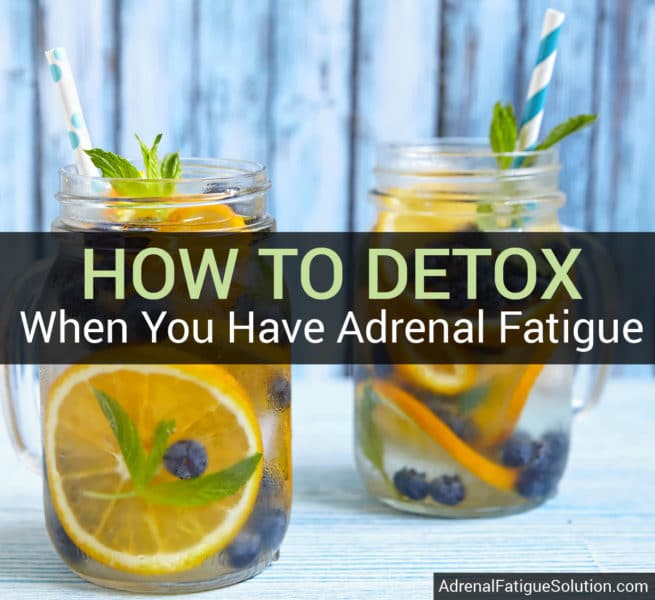The concept of detoxing isn’t new. In fact some people would argue that it isn’t even a concept at all. Our bodies are constantly “detoxing” via normal human processes such as excreting waste or sweating. If natural cleansing didn’t happen on a daily basis, we would simply die.
Of course this is true, but it fails to address an important point. Modern day living is exposing us to more toxins than ever before; air pollution, drug residues from pharmaceutical chemicals, and xenoestrogens in plastic packaging to name but a few. Our bodies are having a hard time keeping up! It’s a 24 hour job to stay ahead of the game, and if you have adrenal fatigue it’s even more important to know how to avoid system overload.
Detoxification is often recommended to help reduce the amount of cellular waste the body has to deal with. For those with adrenal exhaustion this is clearly important. However, what people fail to realise is that getting rid of the rubbish that’s clogging up cells can place an additional burden on an already overworked system. For this reason, knowing how to detox safely is of paramount importance if you plan to embark on a program.
Why you should detox
If you never cleaned out your household drains, they’d eventually back up and become clogged with dirt and debris. You wouldn’t do this to your drains, so why would do it to your body?
Undertaking a detoxification program can be very beneficial. However, as the process involves releasing toxic waste from the cells, going in too quickly means you run the risk of overwhelming the organs of elimination. This isn’t good news if those organs are already taking on the additional burden that overworked adrenals can’t handle.
The Herxheimer effect & adrenal fatigue
If you’ve ever undertaken a cleansing program, you may already be familiar with the Herxheimer effect. This is the reaction that occurs when large amounts of toxins are released into the system which the body can’t eliminate quickly enough. In a nutshell, the detoxification process can lead to the worsening of current symptoms, and in some cases cause new ones to arise. Flu-like symptoms such as headaches and joint pain, malaise and nausea are common. Although it may not make you feel great, this is in fact a sign that healing is taking place. This is why the Herxheimer effect is sometimes referred to as a “healing crisis.”
This reaction is well recognised, and most people are able to cope with the discomfort for a few days while the body adjusts. However, in some cases (for example people who are detoxing for the first time, or those who have a large amount of toxicity in their system) this can make for a very unpleasant experience — aggravating their adrenal fatigue and making them feel very much worse.
How to detox without aggravating your adrenal fatigue
The good news is that fore-armed is fore-warned. If you’re planning on doing a detox, there are a number of things you can do to minimise any unpleasant symptoms.
Doing all you can to keep the channels of elimination open and working efficiently is the absolute best way to speed along the process. This includes supporting organs such as the lungs, liver, kidneys and of course the bowels. The following tips should help ease the process.
- Drink plenty of water to help mobilise toxins out of your system quickly. Getting plenty of fluids also helps to combat dehydration which can lead to constipation. The last thing you need when you’re trying to flush out toxins is bowels which refuse to empty.
- Get outdoors and enjoy the fresh air. An oxygenated blood stream helps move pathogens more efficiently out of the system. Sunshine also provides the body with Vitamin D which helps keep your immune system in tip top shape.
- Reduce your exposure to toxins as much as possible. It’s no good focusing on elimination if you’re going to continue to put rubbish into your body. This means eating clean food which is free of pesticides, additives and preservatives, and avoiding using chemical laden products on your skin and in your home.
- Many people forget that the skin is the largest organ of detoxification in the body. Take steam baths or saunas if at all possible to encourage elimination via the lungs and the skin.
- Include more fiber in your diet to help clear waste from the bowels. Taking a good probiotic will help re-establish the balance of good and bad bacteria in the gut after a period of cleansing.
- Avoid over exercising during the detox period. Make the most of this time to rest and repair. Too much exercise takes vital energy away from the healing process and can cause cortisol levels to spike.
- The lymphatic system is responsible for cleaning up cell debris. Give it a helping hand by dry skin brushing, taking salt baths or treating yourself to a lymphatic drainage massage to support the detoxification process.
Take-away
Undertaking a detox can be very beneficial for people with adrenal fatigue but it needs to be done correctly. The key is to take things slowly and at a pace which won’t flood the system. Most people who undergo a detox program will experience some level of “die off” but provided the channels of elimination are well supported and you’re informed about what to expect, this shouldn’t last more than a couple of days. Managed well, a detox program doesn’t need to be an unpleasant experience.
In the event that an unexpected reaction does occur, the best option is to slow down the process by stopping the detox for a day or two. Herbs and supplements can be useful to minimise any unpleasant symptoms. An adrenal fatigue informed practitioner who has experience in dealing with detoxification can help with this.




Leave a Reply